In China June 4, 1989 is a day remembered in Hong Kong (the only place under Beijing rule where such demonstrations are allowed) and on the Internet.
 The Beijing censors can’t do anything about the Hong Kong demonstrations. (This year, according to demonstration organizers about 150,000 people showed up. Police say the number was closer to 54,000. Either way, the number in Tiananmen Square was easy to calculate: Zero!)
The Beijing censors can’t do anything about the Hong Kong demonstrations. (This year, according to demonstration organizers about 150,000 people showed up. Police say the number was closer to 54,000. Either way, the number in Tiananmen Square was easy to calculate: Zero!)
But Beijing keeps trying to do something about the Internet. Since late May the Internet service in China was sluggish or — in some cases — cut. More websites were definitely “unavailable.”
Fortunately there is the China Digital Times and the China Media Project. Both groups pay close attention to what is going on in the traditional media as well as the Internet in China and spread the word.
I especially like the efforts by China Digital Times to ferret out specific orders to censor items. (The section is called “Reports from the Ministry of Truth.” Thanks to their work we know not only the specific terms the censors in Beijing are worried about but also the issues that have raised the hackles of the government leadership.
This week — like the first week of June every year since 1989 — the censors go into overdrive. (Sensitive Words: 24th Anniversary of Tiananmen) At the same time, the Netizens in China also step up their creative juices.
Here are some of the more innovative terms the censors moved quickly to block:
- 35: Shorthand for May 35th.
- 63+1: 64, i.e. June 4.
- 65-1: 64.
- square of eight (64)
- inappropriate for the public

And my favorite:
The duck comes from an altered picture that showed the famous “Tank Man” (another banned term, by the way) standing up to four giant yellow ducks instead of four PLA tanks.
According to China Media Report, the picture was pulled down within 60 seconds of being posted on the Chinese Twitter-like service Weibo.
FYI: The duck also comes from a 5-story inflatable duck that has been sitting in Hong Kong harbor for a few weeks. It is a piece of art that received a lot of favorable coverage in the Chinese official media.
 Actually, I am amazed the term LEGOS was not blocked as a term as well. (The picture was blocked quickly.)
Actually, I am amazed the term LEGOS was not blocked as a term as well. (The picture was blocked quickly.)
All this attention to June 4 and the bloody suppression of Chinese people calling for reforms within the Communist Party gets the Chinese rulers bent out of shape.
China’s foreign ministry spokesman, Hong Lei, rejected calls by the United States for a full accounting of the crackdown. He said the US should “stop interfering in China’s internal affairs.”
The only problem for China is that it has signed all sorts of international agreements — including the United Nations’ charter — that allows other governments to criticize other countries when human rights are being violated. Plus, this ain’t the 1950s or 1960s when the Chinese leadership can just order a massive campaign that will lead to the deaths of millions. (Great Leap Forward and Cultural Revolution — two other events that are not talked about in China.) China is part of the world today and it needs to start acting like a civilized member of that community.

 The Beijing censors can’t do anything about the
The Beijing censors can’t do anything about the 
 Actually, I am amazed the term LEGOS was not blocked as a term as well. (The picture was blocked quickly.)
Actually, I am amazed the term LEGOS was not blocked as a term as well. (The picture was blocked quickly.)
